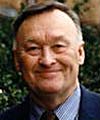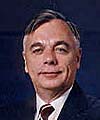|
Oleg Danilovich Kalugin is a retired Major General in the Soviet
KGB. Born in Leningrad in 1934, his father was an officer in Stalin's
NKVD. Oleg Kalugin attended Leningrad State University and was
recruited by the KGB for foreign intelligence work,
|
 |
|
Paul Redmond served as an Intelligence Office of the CIA from
1965 to 1998. In field operations, Mr. Redmond served in East
Asia, Europe and Eastern Europe as case officer and Chief of
Station
|
 |
|
Chief Directorate. Undercover as a journalist, he attended Columbia
University in New York as a Fulbright Scholar in 1958 and then
worked as a Radio Moscow correspondent at the UN in New York,
conducting espionage and influence operations. From 1965 to 1970,
he served as deputy rezident and acting chief of the Rezidency
at the Soviet Embassy in Washington, DC. General Kalugin rose
quickly in the First Chief Directorate, becoming the youngest
general in the history of the KGB, and eventually he became the
head of worldwide foreign counterintelligence. Serving at the
center of some of the most important espionage cases of his period,
including the Walker spy ring, he quickly became known for his
aggressive operational methodology.
General Kalugin's internal criticism of lawlessness,
arbitrary rule, and cronyism within the KGB caused friction with
the KGB leadership, and he was demoted to serve as first deputy
chief of internal security in Leningrad from 1980 to 1987. He
recalls that for the first time in his career, he saw that the
KGB's internal functions had little to do with the security of
the state, and everything to do with maintaining corrupt Communist
Party officials in power. Kalugin retired from the KGB in 1990
and became a public critic of the Communist system. Kalugin's vocal attacks on the KGB won him both notoriety
and a political following. In 1990, Soviet President Mikhail Gorbachev
signed a decree stripping General Kalugin of his rank, decorations,
and pension. General Kalugin then ran successfully for the Supreme
Soviet, or "Parliament" of the USSR. From that post
he continued his attacks on KGB abuses. Following the August 1991
putsch, General Kalugin became an unpaid advisor to reformist
KGB Chairman Vadim Bakatin, who succeeded in the dissolution of
the old state security apparatus, but had little time to reform
it.
In addition to currently teaching regularly at The
Centre for Counterintelligence and Security Studies, General Kalugin
has taught at Catholic University and lectured throughout the
country. He is also the Chairman of Intercon International, which
provides information services for businesses in the former Soviet
Union. He contributes regularly to its Daily Report on Russia
and the former Soviet Republics, and some other US publications.
Since 1998, General Kalugin has been representing in the US The
Democracy Foundation, headed by Alexander Yakolev, a former politburo
member and close ally of Mikhail Gorbachev.
General Kalugin's autobiography, The First Chief
Directorate: My 32 Years in Intelligence and Espionage Against
the West, was published in September 1994 by St. Martins Press.
He collaborated with former CIA Director William Colby and Activision
to produce Spycraft: The Great Game, a CD-ROM game released in
February 1996. General Kalugin has appeared in television news
shows and documentaries all over the world.
|
|
At CIA headquarters, he served in these positions:
Supporting Moscow operations
Chief of Counterintelligence for the Soviet East European Division
Deputy Chief of the Soviet East European Division Deputy Chief
of the Director of Central Intelligence's Counter Intelligence
Center
Special Assistant to the DCI for Counterintelligence and Security
Associate Deputy Director of Operations for Counterintelligence
Investigations of major spy cases including Aldrich Ames and
several in Europe
Mr. Redmond received the Distinguished Intelligence
Medal in 1994, the Federal Order of Merit from the President of
Germany in 1995, and the U.S. National Distinguished Service Medal
in 1999.
Since retirement, Mr. Redmond has consulted in counterintelligence
and was retained by the U.S. House of Representatives Select Committee
on Intelligence. He also served as director of the Central Intelligence
Agency's internal investigation of the Robert Hanssen spy case.
|